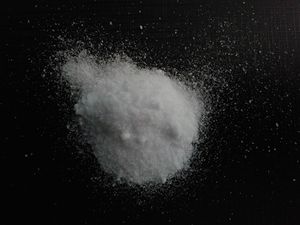Difference between revisions of "Ammonium bicarbonate"
(→Projects) |
|||
| Line 33: | Line 33: | ||
*[[Ammonium carbonate]] synthesis | *[[Ammonium carbonate]] synthesis | ||
*Generate ammonia gas | *Generate ammonia gas | ||
| + | *Synthesize any other ammonium salt. Both carbonates of ammonium are very convenient precursors to all salts of ammonium. | ||
==Handling== | ==Handling== | ||
Revision as of 14:52, 22 September 2015
Ammonium bicarbonate or ammonium hydrogen carbonate is an inorganic compound with the chemical formula (NH4)HCO3. In older literature it may be referred to as hartshorn, as is ammonium carbonate.
Contents
Properties
Chemical
Ammonium carbonate will slowly decompose to give off ammonia, carbon dioxide and water vapors. The reaction occurs faster at higher temperatures:
- (NH4)HCO3 → NH3 + H2O + CO2
Ammonium carbamate is another potential by-product of decomposition.
When treated with acids, it releases carbon dioxide:
- (NH4)HCO3 + HCl → NH4Cl + H2O + CO2
It also reacts with alkali metal halides, giving ammonium halide and alkali metal bicarbonate:
- NH4HCO3 + LiCl → NH4Cl + LiHCO3
- NH4HCO3 + NaBr → NH4Br + NaHCO3
- NH4HCO3 + KI → NH4I + KHCO3
Physical
Ammonium bicarbonate is a white salt, soluble in water, but insoluble in methanol. It will slowly decompose over time, to give off ammonia gas, giving the salt a strong smell. The decomposition occurs faster at high temperatures.
Availability
Ammonium bicarbonate can be bought from food stores as "smelly" baking powder, either pure or mixed with other carbonates, such as sodium bicarbonate or magnesium carbonate. Sometimes it's referred to as simply "ammonium", usually the label name.
Preparation
Ammonium bicarbonate can be made by bubbling carbon dioxide gas through a cold solution of ammonia, at acidic pH.
- CO2 + NH3 + H2O → (NH4)HCO3
Alternatively, it can be made by heating a mixture of ammonium nitrate, sodium bicarbonate or carbonate, and water in one container, and channeling the generated gases into a chilled empty container, where it will crystallize on the walls.
Projects
- Ammonium carbonate synthesis
- Generate ammonia gas
- Synthesize any other ammonium salt. Both carbonates of ammonium are very convenient precursors to all salts of ammonium.
Handling
Safety
Ammonium bicarbonate gives off ammonia fumes, which are irritating and toxic if they build up in a closed environment.
Storage
Ammonium bicarbonate is best stored in closed containers and kept in cold places.
Disposal
Ammonium bicarbonate can be neutralized and safely discarded, as it poses no danger to the environment.
